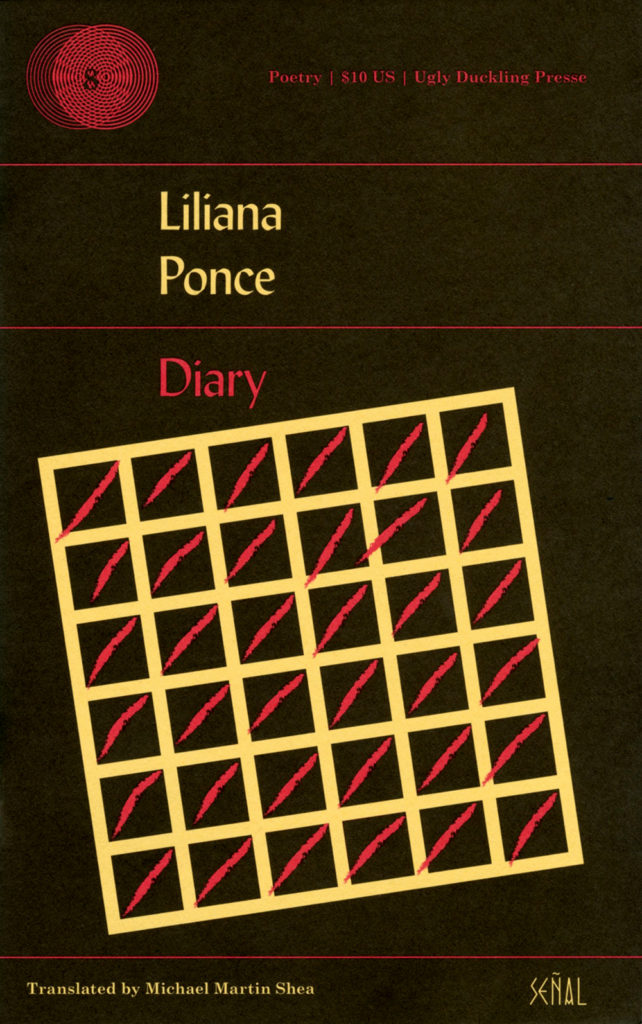16.
Wandering, I risk my own limit. The risk is a loss. If I could wander in the silence, I’d find myself at your side, I could be that forgotten phrase, the one that’s missing, living in the sparkling of buildings without infinity.

16.
Wandering, I risk my own limit. The risk is a loss. If I could wander in the silence, I’d find myself at your side, I could be that forgotten phrase, the one that’s missing, living in the sparkling of buildings without infinity.
Her … body of work is … one of the most personal that has appeared in Spanish in decades.
Reynaldo Jiménez
Inspired by Ponce’s long-standing practice of keeping a daily journal, Diary is a twenty-part sequence that mixes the monotony of a long summer, the anxiety of creation, and a lush dream-scape of forests and vines. The poem meditates on what it means to remember, to wander, and to write while the shadow of the void, of an inevitable nothingness that hides in glances and small objects, lurks beneath the surface. “¿Qué es lo que recomienza?” Ponce asks—what is it that begins again? And where can you begin? Diary introduces English-language readers to the work of one of Argentina’s most singular writers.
Liliana Ponce (Buenos Aires, 1950) is a poet and scholar of Japanese literature and writing. She holds a degree in literature from the Universidad de Buenos Aires and has published five books of poetry in Argentina: Trama continua (Corregidor, 1976), which was awarded the Primer Premio Fondo Nacional de las Artes; Composición (Ultimo Reino, 1984); Teoría de la voz y el sueño (tsé-tsé, 2001); Fudekara (tsé-tsé, 2008); and Paseante y Huésped (Club Hem, 2016). Her poems, essays, and translations of Japanese poetry have appeared in journals both in Argentina and internationally, including Mandorla 8, and her poetry has been featured in many anthologies, including Antología de la Poesía Argentina (Casa de las Américas, Cuba, 1999); Poesía Erótica Argentina (Manantial, Arg., 2002); Antología de Poetas Argentinas 1940-1950 (Ed. del Dock, Arg., 2006), and 200 años de Poesía Argentina (Alfaguara, Arg., 2010). Her work has been previously translated into French and was included in Voix d´Argentine (París, 2006).
Complacency before a poetics based on analogy, not biography, where the time and space of finitude are symbolized by a torrid summer, its atmospheres sifting bodies and the anarchic act of writing this Diary that diverts the imaginary towards the "to develop the sensibility of air." An amazing diary of sensations, not of a biome. From this rare torpor, Michael Martin Shea’s translation emerges.
Lila Zemborain
Someone situates herself in a forest and lets it erase her own limits (of skin, ideas, references), lets that subjectivity grow in the slightest diary. A diary with no aspirations but to let nature, the one that erases the edges of the self, find its partner, its symmetry, in words. By doing that, she both constructs an aesthetic and questions it. She affirms a certain writing and she inquires of it, while the forest, its drowsiness, advances in her, in Liliana Ponce. As if an analogous creature had developed over the summer, as if it were the one writing this diary.
Valerie Mejer
Her intense body of work is, without exaggeration, one of the most personal that has appeared in Spanish in decades.
Reynaldo Jiménez
Michael Martin Shea is the author of the chapbooks of poetry and hybrid writing “Soon” (Garden-Door Press), The Immanent Field (Essay Press), and Comparative Morphologies (above/ground press), as well as the translator of Diary (Ugly Duckling Presse). His poetry has appeared in Conjunctions, Fence, jubilat, PEN Poetry Series, and elsewhere. He lives in Philadelphia, PA, where he is a doctoral student in Comparative Literature and Literary Theory at the University of Pennsylvania and serves as managing editor of the Best American Experimental Writing anthology series. rn
ISBN: 978-1-946433-18-3
Chapbook
staple-bound. 32 pp, 5.25 x 8.25 in
Publication Date: December 01 2018
Distribution: Asterism Books (US)
Series: Señal #8